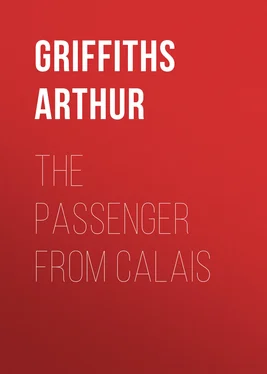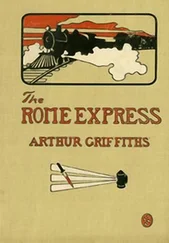Arthur Griffiths - The Passenger from Calais
Здесь есть возможность читать онлайн «Arthur Griffiths - The Passenger from Calais» — ознакомительный отрывок электронной книги совершенно бесплатно, а после прочтения отрывка купить полную версию. В некоторых случаях можно слушать аудио, скачать через торрент в формате fb2 и присутствует краткое содержание. Жанр: foreign_prose, Классический детектив, foreign_detective, foreign_antique, на английском языке. Описание произведения, (предисловие) а так же отзывы посетителей доступны на портале библиотеки ЛибКат.
- Название:The Passenger from Calais
- Автор:
- Жанр:
- Год:неизвестен
- ISBN:нет данных
- Рейтинг книги:4 / 5. Голосов: 1
-
Избранное:Добавить в избранное
- Отзывы:
-
Ваша оценка:
- 80
- 1
- 2
- 3
- 4
- 5
The Passenger from Calais: краткое содержание, описание и аннотация
Предлагаем к чтению аннотацию, описание, краткое содержание или предисловие (зависит от того, что написал сам автор книги «The Passenger from Calais»). Если вы не нашли необходимую информацию о книге — напишите в комментариях, мы постараемся отыскать её.
The Passenger from Calais — читать онлайн ознакомительный отрывок
Ниже представлен текст книги, разбитый по страницам. Система сохранения места последней прочитанной страницы, позволяет с удобством читать онлайн бесплатно книгу «The Passenger from Calais», без необходимости каждый раз заново искать на чём Вы остановились. Поставьте закладку, и сможете в любой момент перейти на страницу, на которой закончили чтение.
Интервал:
Закладка:
So for half an hour I abused her fiercely; I swore at myself hotly as an ass, a hopeless and unmitigated ass, ever ready to be betrayed and beguiled by woman's wiles, the too easy victim of the first pretty face I saw. The fit lasted for quite half an hour, and then came the reaction. I heard her rich deep voice singing in my ears, I felt the haunting glamour of her eyes, remembered her gracious presence, and my heart went out to her. I was so sorry for her: how could I cast her off? How could I withhold my countenance if she were in real distress? She was a woman—a weak, helpless woman; I could not desert and abandon her. However reprehensible her conduct might have been, she had a claim to my protection from ill-usage, and I knew in my heart that she might count upon a good deal more. I knew, of course, that I ought not to stand between her and the inevitable Nemesis that awaits upon misdeeds, but what if I helped her to avoid or escape it?
The opportunity was nearer at hand than I thought. My kindly intentions, bred of my latest sentiments towards Mrs. Blair, were soon to be put to the test.
CHAPTER V
The train reached Amiens punctually at 5 p.m., and a stoppage of five minutes was announced. I got out to stretch my legs on the platform. No one took much notice of us; it must have been known that the train was empty, for there were no waiters from the buffet with café au lait or fruit, or brioches —no porters about, or other officials.
I had not expected to see any passengers come on board the train, a through express, made up of sleeping-cars and a supplementary charge on the tickets. But on running into the station (ours was the first carriage) I had noticed a man standing with a valise in his hand, and I saw him following the train down the platform when we stopped. He addressed himself to a little group of conductors who had already alighted, and were gossiping idly among themselves, having nothing else to do. One of them indicated our particular attendant, to whom he spoke, and who brought him directly to our carriage.
Evidently the newcomer was bound for Lucerne via Basle. Here was one more occupant of our neglected train, another companion and fellow traveller in our nearly empty sleeping-car. Curiosity and something more led me to examine this man closely; it was a strange, undefined, inexplicable sense of foreboding, of fateful forecast, that he and I were destined to be thrown together unpleasantly, to be much mixed up with one another, and to the comfort and satisfaction of neither.
Who and what was he? His position in life, his business, trade or calling were not to be easily fixed; a commercial man, an agent or "traveller" on his own account, well-to-do and prosperous, was the notion borne out by his dress, his white waistcoat and coloured shirt of amazing pattern (a hint of his Italian origin), his rings and the showy diamond pin in his smart necktie.
I added to this, my first impression, by further observation, for which I soon had abundant opportunity. When the train moved on, he came and took his seat on the flap seat (or strapontin ) just opposite my compartment. I could not tell why, until presently he made overtures of sociability and began a desultory talk across the corridor. My cabin or compartment, it will be remembered, was the last but one; the newcomer had been given the one behind mine, and here from his seat he commanded the whole length of the carriage forward, which included the compartment occupied by Mrs. Blair and her party.
I cannot say that I liked his looks or was greatly attracted by him. He was not prepossessing. Fair, with a flaccid unwholesome complexion, foxy haired, his beard cut to a point, small moustaches curled upward showing thin pale lips, and giving his mouth a disagreeable curve also upwards, a sort of set smile that was really a sardonic sneer, conveying distrust and disbelief in all around. His eyes were so deep set as to be almost lost in their recesses behind his sandy eyelashes, and he kept them screwed up close, with the intent watchful gaze of an animal about to make a spring. His whole aspect, his shifty, restless manner, his furtive looks, all were antipathetic and to his great advantage. I did not take to him at all, and plainly showed him that I had no desire for his talk or his company.
It was not easy to shake him off, however. He would take no offence; I was cold to positive rudeness, I snubbed him unmercifully; I did not answer his remarks or his questions, which were incessant and shamelessly inquisitorial. Nothing disconcerted him. I had all but shut the door of my compartment in his face, but it suddenly occurred to me that he was capable of wandering on, and when he found the ladies inflicting his greasy attentions upon them.
I felt that I had better submit to his unpalatable society than let him bore Mrs. Blair with his colossal impudence.
How right I was in this became at once apparent. He had taken out a cigar-case and pressed one upon me with such pertinacious, offensive familiarity that I could see no way out of it than by saying peremptorily:
"You cannot smoke here. There are ladies in that compartment yonder."
"Ladies indeed! You surprise me," but I saw a look on his face that convinced me he perfectly well knew they were there. "Ladies, aha! How many, may I ask?"
"One at least, with her maid and a child," I replied gruffly.
"And a child," he repeated, as if by rote. "Does monsieur, tell me quickly, I—I—beg—know them! Can he describe them to me?"
"I shall tell you nothing about them. What the mischief do you mean by asking me questions? Find out what you want for yourself." I was hot and indignant with the brute.
"By George, you're right. I'll go and ask for leave to smoke. I shall find out then," and he jumped up, the spring seat closing with a bang from under him.
The noise concealed the sound of the electric bell which I had pressed to summon the attendant, as I rushed out and caught the other man by the arm.
"You'll do nothing of the kind," I cried with very vigorous emphasis, backed by all my strength. "I'll shake you to a jelly if you dare to move another inch."
"Here, I say, drop it. Who the deuce are you? None of your bally nonsense. Hands off, or I'll make you."
But he was too soft and flabby to avail much, and I dragged him back helplessly with tightened grip, only too delighted to try conclusions with him.
At this moment the conductor appeared upon the scene, and began to expostulate loudly.
"Here, I say, what's all this? It can't be allowed. No fighting and quarrelling are permitted."
"Well, then, people must behave themselves," I retorted. "Don't let this chap annoy your passengers."
"I have done nothing to annoy them," stammered the other. "You shall answer for this. I've done no harm."
"I'll see you don't. Get in there and stay there;" and with that I forced him, almost flung him, into his compartment, where he fell panting upon the velvet sofa.
"You'd better keep an eye on him," I said to the conductor, who was inclined to be disagreeable, and was barely pacified by a couple of five-franc pieces. "Fellows of this sort are apt to be a nuisance, and we must take care of the ladies."
As I said this I saw Mrs. Blair's face peering out beyond her door a little nervously, but she ventured to come right out and along the passage towards me.
"What has happened? I heard some noise, high words, a scuffle."
"Some ruffian who got in at Amiens, and who has had to be taught manners. I told him not to smoke here, and he wanted to intrude himself upon you, which I prevented, a little forcibly."
"Where is he? In here?" and she followed the indication of my thumb as I jerked it back, and looked over my shoulder into the compartment.
Читать дальшеИнтервал:
Закладка:
Похожие книги на «The Passenger from Calais»
Представляем Вашему вниманию похожие книги на «The Passenger from Calais» списком для выбора. Мы отобрали схожую по названию и смыслу литературу в надежде предоставить читателям больше вариантов отыскать новые, интересные, ещё непрочитанные произведения.
Обсуждение, отзывы о книге «The Passenger from Calais» и просто собственные мнения читателей. Оставьте ваши комментарии, напишите, что Вы думаете о произведении, его смысле или главных героях. Укажите что конкретно понравилось, а что нет, и почему Вы так считаете.












